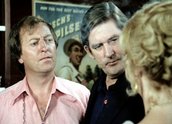


Don’s Party (1976)
Synopsis
On federal election night in 1969, Don and Kath Henderson (John Hargreaves and Jeanie Drynan) host a party, to celebrate what they expect will be a Labor victory after 20 years of conservative government. Most of their friends vote Labor. As the television results dash their hopes, the men devote their energies to drinking and debauchery with the younger women, while their wives and girlfriends scowl. There are punch-ups, match-ups, feel-ups and knock-backs as disappointment takes over from hope.
Curator’s notes
David Williamson’s play opened at La Mama in Melbourne in 1971, two years after the 1969 election, but before the Whitlam Labor government did finally win power, so the disappointment of Don Henderson (John Hargreaves) and his friends was still current, at least for some viewers. The play was changed little for the film – off-stage bedroom scenes became on-screen sex scenes, and Bruce Beresford added a romp in the neighbour’s pool, which allowed for more nudity and more comedy, as the men were then both naked and drunk, rather than just drunk.
Even though the film is more socially critical, there is a certain connection to Beresford’s earlier work directing The Adventures of Barry McKenzie. Both films feature boozing Australian men chasing women and behaving like louts – but in Don’s Party, they’re almost all university educated. The script is one of Williamson’s best, a savagely funny satire on middle-class mores that leaves no pretension untouched. Much of it is about disappointment for the Australian male – the has-been (Ray Barrett); the coulda-been (Hargreaves);the never-was (Graham Kennedy); and the never-will-be (Graeme Blundell). This is matched by a larger disappointment from the women, but mostly it’s about the men – their lack of seriousness, maturity, responsibility, or warmth.
It’s an hilarious but bleak film about life in the Australian suburbs, and the boredom that produces such extremes of behaviour. Williamson has been criticised for his female characters, but they have most of the best speeches in Don’s Party and their complaints about the men in their lives hold much of the film’s truth.
- Overview
- Curator’s notes
- Video 3 clips
- Principal credits
- Find a copy
- Make a comment
- Map
- Add your review



